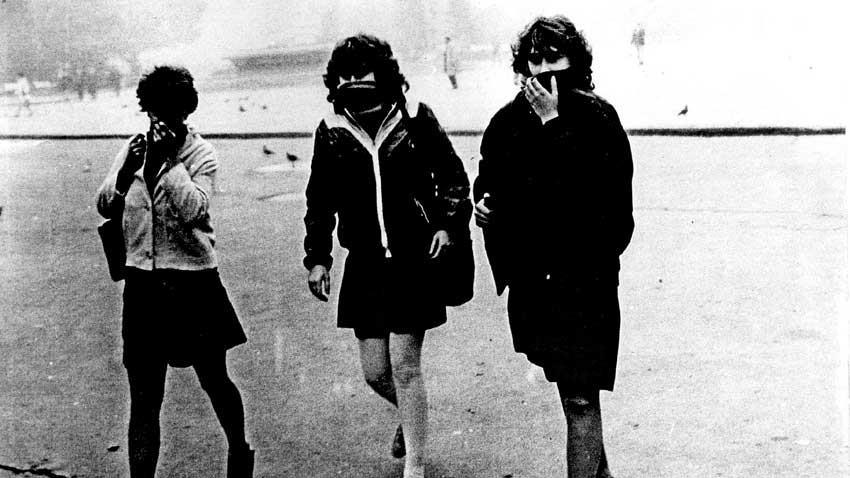A red scarf-tying ceremony took place in front of the Monument to Freedom downtown Ruse on 23 September 1987 for the pioneri-to-be children aged 9. At the same time the cloud with the suffocating smell of chlorine was crawling from the Romanian town of Giurgiu on the other bank of the Danube River. Some of the kids fainted, others took off the scarves and used those as gas masks. No one dared to cancel the freaky ceremony. However, that was the last drop that filled the cup of patience to overflowing and the Ruse mothers began to organize a peaceful protest, in order to make the authorities stop closing their eyes to the problem. The chlorine producing plant in Giurgiu, built up a few years before that exceeded its capacity 10 – 12 times, causing a strong concentration of the poisonous gas in the air. The citizens of Ruse were constantly exposed to gas pollution, the number of respiratory diseases went up in a drastically, many had to move to other settlements, in order to protect their health.
The first civic protest in the end of socialism took place precisely in Ruse in November 1987 against the gassing and protecting fundamental human rights, such as the one of healthy environment. The first and biggest informal organization in Bulgaria was established several months afterwards – the Public Committee for Environmental Protection of Ruse. 400 people took part in the inauguration in the evening of 8 March 1988 at the House of Cinema downtown Sofia, after an almost illegal screening of the “Breathe” documentary of director Yuryi Zhirov. That was the first serious informal organization, which protested against the communist regime in this country.

Member of the Ruse Committee and director Malina Petrova recalls: “The tension went up to a revolutionary extend – the people demanded something to be done and we, the organizers were blinking in front of that disaster. Then I had this brilliant idea – 8 March, women’s day. The control could be lowered on that day only due to the celebrations…”
“That was a manifestation of persons, who had overcome their fear, within a few hours only, who had somehow anticipated the end of the system,” Chair of the Committee Georgi Mishev writes. Here is an interview with him from the Golden Archive of the BNR:
 “In a word it was a bit tough to say whether they could breathe or not, but still we had a breakthrough of the old system and there was hope for the birth of a true civic society. That was the point of the Ruse Committee – the start of civic society, of an opposition against the regime back then.”
“In a word it was a bit tough to say whether they could breathe or not, but still we had a breakthrough of the old system and there was hope for the birth of a true civic society. That was the point of the Ruse Committee – the start of civic society, of an opposition against the regime back then.”
Is it true that the communist party had interest to infiltrate its own people inside these oppositional structures, in order for the latter to create obstacles before the authenticity of the civic protest?
We can hear these voices nowadays as well. Historian Bozhidar Dimitrov says the committee was an idea of the communist ruler back then – Todor Zhivkov with the goal to cope with the other dictator - Romanian Ceausescu. Well, if he has any proofs of that, let him publish them… It was easy to create the impression that we had been some sort of straw men, following the orders of the party. That is a way to belittle an event that was spontaneous in its core. Nobody expected the range of that event to be so big. 400 signed and that was an act of open resistance to the authorities. It is a fact. Our task was to help the society overcome its fear and to transfer this fear to the authority, which is always afraid of the society.”
The fear of the authority of civic organizations is understandable, as it tries to control and guide the civic society. It all explains why spontaneous and authentic civic protests were a tough task back in the socialist era.
However, the Ruse Committee was the first white swallow after decades of totalitarian rule. It was a sign for the end of an epoch and the birth of a new period in the country’s history. Several other civic organizations appeared as of the following year and after 45 years of a totalitarian regime it was time for democratic changes and a transit to democracy and free market economy.
English version: Zhivko Stanchev
He was the most handsome pianist of his time. Elegant, proud and unreachable, he looked as if he was born with a tailcoat in Sofia in 1929. This is how Berlin newspaper "Die Welt" described Alexis Weissenberg. Born in Sofia, the..
“I believe that even talented playwright Stanislav Stratiev who wrote the role in the emblematic movie Band With No Name especially for Velko Kunev, would have found it hard to find words of solace if he were here with us now. Velko..
„What is happening around the world, concerns us, and the more we turn a blind eye to that it concerns us, the more we get encaged in our domestic problems and narrow our horizon, the more inadequate we become in making..

+359 2 9336 661
